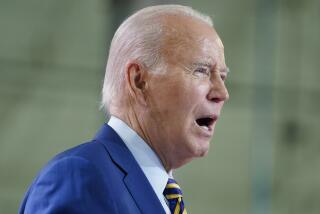Pressure mounts on healthcare reform
- Share via
WASHINGTON — With divisions among congressional Democrats threatening to stall his healthcare overhaul, President Obama moved aggressively Monday to shore up support, meeting with senior Democratic lawmakers and labor leaders at the White House and stressing that it’s time for action.
Today, the president travels to economically struggling Michigan, where he is expected to underscore the need to make medical care more affordable and available.
But events are pushing Obama to a crucial decision: when and how to plunge more directly into the specifics of the sensitive negotiations.
In particular, he is under mounting pressure to spell out where he stands on two of the most divisive questions confronting lawmakers: how to pay for an overhaul that will cost at least $1 trillion over the next 10 years, and whether it should include a new government-run insurance program as an alternative to private coverage.
Senior White House officials meet regularly with congressional Democrats and interest groups across the political spectrum, but the president has limited his role to that of cheerleader for a major overhaul -- a role he resumed Monday after returning from last week’s overseas trip.
“I just want to put everybody on notice, because there was a lot of chatter during the week that I was gone: We are going to get this done,” Obama said while introducing his choice as surgeon general, Dr. Regina M. Benjamin.
“Inaction is not an option,” he said. “And for those naysayers and cynics who think that this is not going to happen, don’t bet against us.”
The president pressed senior House and Senate Democrats to complete work on their healthcare bills before their August break, according to Democratic aides.
“The coming weeks are . . . a critical time,” Senate Majority Leader Harry Reid of Nevada said.
The president’s decision not to spell out what he wants can be frustrating for rank-and-file members of Congress, said Chris Jennings, a senior healthcare advisor in the Clinton administration who also worked on Capitol Hill for 10 years. “There is always pressure to get more involved.” But Jennings and other veterans of past healthcare battles said choosing sides too early can be risky.
“The president can only be used so many times,” said Harold M. Ickes, who was a senior aide to Clinton. “And they [the White House] have to be careful so that when he really lays down the law, or tries to break a deadlock on any particular issue, that it’s done at the right time. Otherwise, he runs the risk of looking impotent.”
In addition to divisions among Democrats -- and near-solid opposition among Republicans -- many leading interest groups that have supported the overhaul have begun voicing concerns.
“We know this is the first inning of a nine-inning game,” said Michelle Dimarob, a lobbyist for the National Federation of Independent Business, which helped derail the Clinton administration’s push for a healthcare overhaul. “But we have not seen the things that small businesses need to see.”
Obama already has indicated his preference for a new government-run health insurance plan, a cornerstone of how liberals in his party want to achieve universal coverage.
The president has also signaled his opposition to taxing some of the health benefits Americans receive from employers, a proposal that had been discussed by the Senate Finance Committee.
Those messages have been important, said Richard Kirsch, national campaign manager of Health Care for America Now, a leading liberal grass-roots coalition that works with groups such as MoveOn.org. “I think they have been clear about what they want in the plan,” he said.
Senior administration officials have been talking regularly with senior Democrats who are working on healthcare legislation. Last week alone, Senate Finance Committee Chairman Max Baucus of Montana had meetings with White House Chief of Staff Rahm Emanuel, Treasury Secretary Timothy F. Geithner, Budget Director Peter R. Orszag and White House Office for Health Reform director Nancy-Ann DeParle, among others.
Senate leader Reid also traveled to the White House last week to discuss healthcare.
For the immediate future, at least, Obama will continue to press for change, according to administration officials and congressional aides.
“He’ll be talking about it very frequently,” said one White House aide.
--
peter.nicholas@latimes.com
More to Read
Get the L.A. Times Politics newsletter
Deeply reported insights into legislation, politics and policy from Sacramento, Washington and beyond. In your inbox twice per week.
You may occasionally receive promotional content from the Los Angeles Times.











